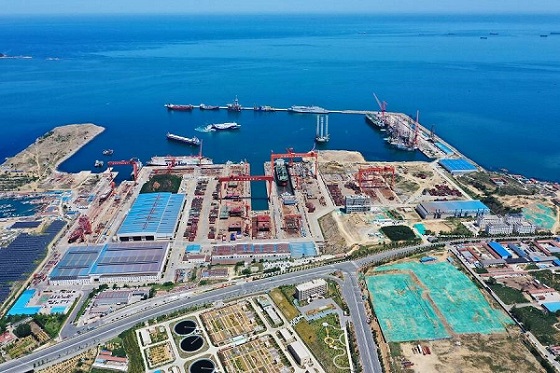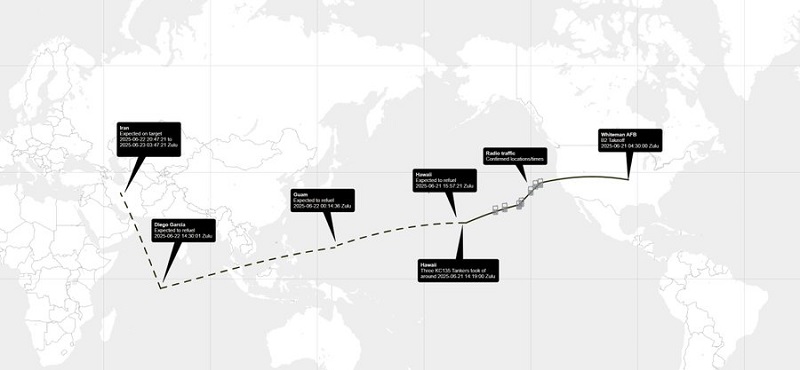Crime
How the CCP’s United Front Turned Canada’s Legal Cannabis Market into a Global Narcotics Brokerage Network
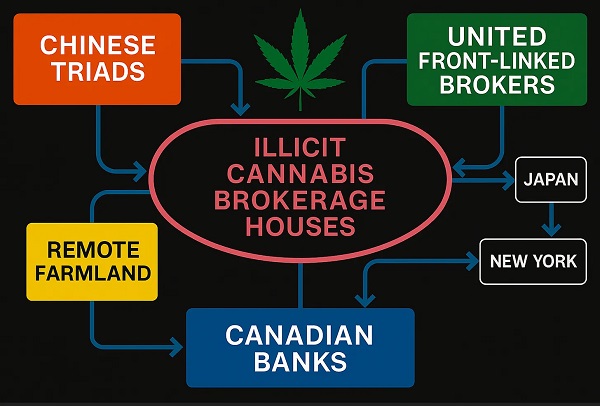
Short-term rentals. Legal weed. Illegal exports. United Front agents built a decentralized drug trafficking network—using Canadian land and export markets to fuel China’s narco-financial machine.
VANCOUVER, Canada — Around the time Canadian police uncovered a massive Chinese drug cash bank in Richmond, B.C.—exposing the so-called Vancouver Model of transnational money laundering—investigators made another stunning discovery that has never before been publicly disclosed.
According to sources with direct knowledge, operatives tied to Beijing’s foreign influence arm, the United Front Work Department, were orchestrating a parallel cannabis trafficking and money laundering operation—leveraging Canada’s legalization of marijuana to export the lucrative commodity to the United States and Japan. The scheme used short-term rental platforms to operate illicit cannabis brokerage houses in Vancouver, aggregating product from vast acreages across Western Canada and shipping it to destinations including Tokyo and New York City. Proceeds were collected in United Front-linked drug cash brokerages in those cities and laundered back through Canadian banks.
As previously reported by The Bureau, the RCMP has observed a two-decade-long consolidation of legal cannabis licenses in British Columbia by Chinese state-linked mafia networks. These groups have exploited illegal migrant labor from Asia—often housed in suburban townhomes and single-family grow-ops across Vancouver—to power what amounts to a parallel, state-enabled narco economy.
But as real estate prices in Metro Vancouver soared—driven in part by drug capital—RCMP investigators noticed Chinese triads strategically selling off high-priced grow-op properties to avoid scrutiny and reinvesting profits in remote farmland across B.C., including in Oliver, Prince George, and the Okanagan Valley.
These rural acreages became production zones. Asian organized crime groups transported cannabis to centralized brokerage houses, where senior Sam Gor figures and affiliated United Front community leaders established hubs for transnational shipment, trafficking, and laundering. The system—structured like a decentralized factory—was engineered to distribute risk and rapidly shift locations.
“They transport it down, and then we started seeing the rise of these brokerage houses again, with United Front control and Asian organized crime links,” a Canadian intelligence source told The Bureau. “New York is a favourite destination. The weed goes out in a variety of routes, the money comes back to be laundered. The process is repeated.”
In the case that triggered the discovery, an RCMP informant observed a steady stream of individuals entering a Vancouver-area home with black garbage bags, heading into the garage, and emerging minutes later with duffel bags of unknown contents. To detectives from E-Pirate—Canada’s largest-ever casino money laundering investigation—the duffel bags looked strikingly familiar.
This was the same method used by Chinese high-rollers supplied through a Sam Gor-linked cash brokerage in Richmond. In that case, associates of Paul King Jin and Jian Jun Zhu received large cash deposits at a bulletproof-glass storefront called Silver International—funds delivered by drug traffickers from across Western Canada. Couriers from Alberta and B.C. drove proceeds into Richmond, dropped off suitcases of cash, and each transaction was meticulously recorded in paper ledgers. Sam Gor would then transfer the equivalent funds into Chinese bank accounts—often linked to fentanyl production.
The warehoused cash at Silver International was also loaned to Chinese gamblers, with Paul Jin himself frequently delivering bundles to parking lots outside River Rock Casino in Richmond, as well as to other government-run casinos in Burnaby and surrounding suburbs. The funds were laundered through B.C.’s provincially regulated gaming system. This was the Vancouver Model. Chinese high-rollers provided liquidity to the system by depositing funds into United Front-linked bank accounts in China, then receiving their payouts in Richmond—delivered in duffel bags of cash.
The discovery of cannabis collector sites near these casinos resembled the other side of the pipeline—this time focused on cannabis rather than cocaine, fentanyl, or methamphetamine—a ‘legal’ narcotics trade now dominated across North America by Chinese organized crime networks operating in tandem with CCP-linked regional officials, according to former DEA Special Operations Division leader Don Im.
In this operation, RCMP investigators recorded license plates of drivers arriving at the suspected brokerage house. They matched many of them to vehicles also seen at Paul Jin’s Richmond boxing gym—an establishment tied to the highest levels of Sam Gor and UFWD figures in Vancouver.
“It was just phenomenal,” a Canadian intelligence source said. “And all of it links back, ultimately, to the exact family and community of people that we’ve talked about for years. You’d see a girlfriend—the girlfriend’s car of some well-known guy that goes to Paul Jin’s gym—would be showing up at this place for five minutes, would drive away, and then somebody else’s car which was associated to this guy’s girlfriend.”
In one RCMP raid on a brokerage house, investigators seized not only cannabis, but packaging materials and branded labels imported from Asia via commercial carriers—designed for a recognizable brand of cannabis sold online.
“What these guys were doing,” the source disclosed, “was securing rental houses through VRBO or other short-term platforms—one, two, three months at a time—and using them as brokerage houses. Then they’d move to another location. And they would bring in labor from overseas.”
That labor, often undocumented immigrants from China and Vietnam, was found living in squalid, makeshift conditions.
“Mattresses on the floor,” the source said. “This is where we get into the CBSA piece—where they found people at these locations who were overstays, undocumented, all the rest of it—and they would boot them out.”
The level of sophistication in these narcotics brokerage operations—essentially the mirror image of Chinese cash collection hubs uncovered by DEA agents in the United States—stunned RCMP intelligence officials.
They noted unintended consequences stemming from cannabis legalization under Prime Minister Justin Trudeau’s Liberal government in 2018.
“Since legalization, Asian organized crime has emerged as the dominant force behind cannabis in Canada. Product from grow ops in the interior of B.C. gets consolidated at a variety of VRBO and short-term rental houses in the Lower Mainland,” one source texted to The Bureau. “Brokers bid on product and provide packaging services for online sales.”
“In one case, the brokerage house was in the east end of Vancouver,” the source, who could not be named, said. “It was equipped with a cryptocurrency ATM. Come in, pay by Bitcoin, leave with your weed.”
The discovery of these covert brokerages prompted RCMP transnational crime investigators to dig deeper.
“And that led to a couple of other investigations,” the source said. “And that led to marijuana that we knew was getting shipped to New York State. They really liked B.C. Bud.”
According to the source, the cannabis was often transported overland across Canada in commercial vehicles, hidden inside consumer goods.
“We found evidence of water coolers and stuff like that, or on-demand water heater systems—gutted and repurposed just to move the product. They’d drive it across the country with this stuff packed inside.”
And Sam Gor operatives transported Canada’s “legal” weed through Ontario and across the border into the United States.
“They would get it over into New York State,” the source said. “And then we actually—years previous to this—we did a money laundering file where we were receiving back the money from those proceeds, coming back through the United States from New York. So it showed you a full circle of it.”

Meanwhile, a source added that a small island in the Fraser River, near River Rock Casino, has drawn law enforcement attention due to warehouses allegedly controlled by Sam Gor associates and underground bankers connected to the Silver International case and United Front networks.
“There’s a whole series of warehouses there that are of extreme interest to CBSA and to us,” a source said, explaining that consumer goods from across Western Canada are exported from the location, with narcotics secreted inside, and product labels altered to evade international customs scrutiny.
“What they did is they secreted—they would cut open the bags and they’d put marijuana inside those bags, and then they were going to export to Japan,” the source said. “So that’s the kind of thing that we’re seeing going on here as well—these brokerage facilities are multipurpose. Some of the product is also moved to other locations where they’re actually altering packaging and everything else to head off detection.”
“That use of brokerage houses—just moving it around—is extremely common now,” the source added. “In fact, that’s been known for years—even over in Australia.” Describing a typical “shore party” tactic, the source said:
“They’ll send a local guy from Vancouver down to Sydney. He’ll stay in a VRBO at Bondi Beach. While he’s there, a UPS package arrives. He takes it to a drop point, gets paid, spends a few days on the beach, and flies home. From the AFP’s perspective, they find that, obviously, quite difficult too.”
Asked whether these Sam Gor and United Front-linked cannabis trafficking and money laundering networks were also dealing in fentanyl, one source responded bluntly:
“No doubt. When you are in one aspect of the biz, what’s the disincentive not to be in fentanyl too? Or wine, or cigarettes.”
Former DEA Special Operations Division leader Don Im, a veteran expert on China’s transnational narcotics and money laundering architecture, reviewed the evidence cited in this story for The Bureau. Decades ago, as a young agent in New York City, Im said he witnessed the early evolution of Triad-linked money laundering networks—surveilling Colombian heroin traffickers forging connections in Chinatown.
Prior to his retirement in 2022, Im said he had direct visibility into how Chinese Communist Party-linked drug barons—operating through Sam Gor and allied Triad syndicates—seized control of cannabis cultivation across much of the world. These networks, he explained, have repurposed the same smuggling corridors, laundering systems, and brokerage house infrastructure to traffic a range of narcotics, from synthetic opioids to methamphetamine.
“This playbook was being mirrored throughout the U.S., Canada, Europe,” Im said of the cannabis brokerage system described in this story.
“The Chinese have become the dominant cultivators of marijuana in North America, in my opinion. They’re doing it in Europe, too. Why? Because it’s legal in most places—with little to no risk of imprisonment. So they’re generating literally tens of billions from marijuana alone.”
Im said U.S. law enforcement began noticing the pattern around the same time Canadian police observed Triads consolidating medicinal marijuana licenses in British Columbia.
“We started seeing it in the mid-2000s—Chinese workers coming into indoor grows, especially in Colorado,” he said. “At first, we thought it was an anomaly. But it wasn’t.”
“Now, China holds an annual hemp trade fair because they’re trying to corner the global hemp industry. They bring in thousands of companies and individuals to expand the global marijuana market.”
According to Im, Chinese Communist Party officials—particularly in provincial governments—view global decriminalization trends as a strategic opening to dominate transnational black markets with minimal legal risk.
“The global drug markets have become the ad hoc bank not just for Chinese citizens seeking to move capital abroad—but for CCP officials, provincial governors, and state-owned enterprises,” Im said. “They use drug proceeds to pay off massive debts, fund capital projects, finance Belt and Road operations, and carry out influence campaigns. It’s a cycle.”
“People think, ‘Oh, marijuana is a benign drug.’ Okay? It’s still a drug. And the value it generates—the profit—is massive,” Im continued. “Even on a conservative estimate, we’re talking half a trillion to three-quarters of a trillion dollars annually. That’s off the streets and across the world—not just Europe and North America.”
“People think I’m crazy when I say it generates that much,” he added. “But the RAND Corporation and the U.N.—they track the value of heroin, cocaine, methamphetamine, fentanyl, ecstasy, and marijuana. That’s the number.”

Recommend The Bureau to your readers
Crime
Florida rescues 60 missing kids in nation’s largest-ever operation
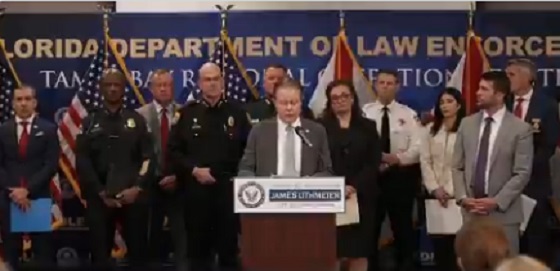
Quick Hit:
Florida authorities have recovered 60 “critically missing” children in a two-week operation across the Tampa Bay area. The joint state and federal effort, dubbed Operation Dragon Eye, led to eight arrests and uncovered new human trafficking investigations.
Key Details:
-
The children, aged 9 to 17, were found across Hillsborough, Pinellas, and Pasco counties. The operation was carried out with help from the U.S. Marshals, state prosecutors, and local police departments.
-
Florida Attorney General James Uthmeier confirmed eight individuals were arrested on charges including human trafficking, child endangerment, and drug-related offenses. Additional investigations are underway.
-
The Florida Department of Law Enforcement (FDLE) hailed the operation as the most successful child recovery effort in U.S. history, declaring, “Florida doesn’t look the other way — we hunt predators and bring kids home.”
🚨 MAJOR BREAKING: U.S. Marshals and Florida officials announce LARGEST single child rescue operation in American history.
Over 2 weeks, 60 KIDS are safe, in custody.
This involved over 20 agencies and 100+ people. 8 people were arrested, charged with human trafficking, child… pic.twitter.com/trkcFMhtmX
— Eric Daugherty (@EricLDaugh) June 23, 2025
Diving Deeper:
Over a two-week span, law enforcement agencies across Florida joined forces for what’s being called a historic child recovery mission. Dubbed Operation Dragon Eye, the coordinated effort led to the rescue of 60 critically missing children—some as young as 9 years old—in the Tampa Bay region, including Hillsborough, Pinellas, and Pasco counties.
According to Fox 13, federal and state agencies worked alongside local law enforcement, with direct involvement from the U.S. Marshals Service and Florida prosecutors. The term “critically missing,” as defined by the Marshals Service, applies to minors facing heightened threats such as exposure to violent crime, sexual exploitation, substance abuse, or domestic violence.
Florida Attorney General James Uthmeier praised the operation’s success in a statement posted to social media Monday. “We will keep fighting evil head-on and bringing accountability to those who harm children,” he said, confirming eight suspects had been taken into custody, with additional investigations now underway related to human trafficking networks.
Charges filed against the arrested individuals include human trafficking, child endangerment, custodial interference, and drug possession.
The Florida Department of Law Enforcement described the effort as “the most successful missing child recovery operation in American history.” In a statement, the agency said its analysts and field agents “were proud to stand shoulder to shoulder with the U.S. Marshals” and emphasized that “Florida doesn’t look the other way.”
Several nonprofits and local support groups played a vital role in caring for the recovered children, including More Too Life, the Children’s Home Network, Bridging Freedom, Bridges of Hope, Family Support Services of Pasco and Pinellas, and Redefining Refuge.
Dr. Katherine Gomez of the Florida Department of Juvenile Justice said many of these children had felt hopeless and alone. “Oftentimes these young people have felt like there’s no one in their corner. They feel abandoned… like they have to look out for themselves because no one else will,” she told WFLA.
FDLE Commissioner Mark Glass acknowledged the emotional toll such operations take on officers, who are exposed to the trauma these children endure. “They have to see everything that happens to these children, and we need to pray for them because they had to take that burden home,” he said.
Glass added that while the operation struck a major blow to human trafficking in the region, the threat remains. “The fight isn’t over.”
U.S. Marshal Bill Berger of the Middle District of Florida warned that traffickers often return to their victims if not apprehended. “If the offenders are not apprehended, they will reconnect with these children. They are, in my opinion, leeches,” Berger stated.
Officials vowed continued vigilance to keep predators behind bars and ensure every vulnerable child is found and protected.
Crime
UK finally admits clear evidence linking Pakistanis and child grooming gangs

Quick Hit:
After years of denial and political cover-ups, the UK government has formally acknowledged a disturbing link between Pakistani-heritage men and child grooming gangs. A scathing new review has prompted Prime Minister Keir Starmer to reverse course and launch a full national inquiry into the widespread abuse.
Key Details:
- The Casey Review found “clear evidence” of Pakistani men’s overrepresentation in grooming gangs and accused authorities of ignoring the abuse to avoid accusations of racism.
- Home Secretary Yvette Cooper confirmed over 800 historic child sex abuse cases will be reopened and prosecuted where possible.
- The Labour Party and Prime Minister Starmer were previously opposed to a national inquiry, with critics calling this reversal a politically motivated “smokescreen.”
Diving Deeper:
The British government has finally acknowledged a link between Pakistani-heritage men and the grooming gang epidemic that has plagued communities across England for decades. The admission comes following the release of a damning public review led by Baroness Louise Casey, which uncovered years of institutional failure, racial sensitivity, and political cowardice.
Home Secretary Yvette Cooper presented the findings in Parliament, confirming that the Casey Review had “identified clear evidence of over-representation among suspects of Asian and Pakistani-heritage men.” She condemned the systematic rape of vulnerable girls—some as young as 10—and the authorities’ “unforgivable” failure to act.
“The sexual exploitation of children by grooming gangs is one of the most horrific crimes,” Cooper said, noting that too many warnings had been ignored over the last 15 years. She announced that the government would adopt all of Baroness Casey’s recommendations and reopen more than 800 historic cases.
Prime Minister Keir Starmer, who previously dismissed calls for a national inquiry as “far-right misinformation,” abruptly changed course over the weekend and agreed to a full inquiry with legal authority to compel testimony. This reversal followed mounting pressure from campaigners like Dame Jasvinder Sanghera, Elon Musk, and Reform UK’s Nigel Farage.
Labour MP Sarah Champion, once ousted for raising alarms about Pakistani grooming gangs in her Rotherham constituency, welcomed the inquiry. “There’s a real sense justice has not been handed out fairly,” she said, accusing officials of failing victims for fear of “causing offense.”
The Casey review also pointed to illegal immigration as a contributing factor and called for mandatory ethnicity data collection in child exploitation cases. Critics argue that authorities in Labour-run areas turned a blind eye to the abuse—some allegedly in exchange for votes—treating white working-class girls as expendable while shielding perpetrators.
Former detective and grooming whistleblower Maggie Oliver expressed skepticism, warning that unless the inquiry is led by Baroness Casey, it risks becoming another whitewash. “This is about gross criminal neglect at the top of policing, at the top of government, at the top of social services,” Oliver said.
While the inquiry marks a long-overdue step toward accountability, some warn it may be politically perilous for Starmer. As former head of the Crown Prosecution Service, he held a central role when many of these abuses first surfaced. And with many of the cover-ups tied to Labour councils, the fallout could deepen public distrust in the party.
-

 Bjorn Lomborg1 day ago
Bjorn Lomborg1 day agoThe Physics Behind The Spanish Blackout
-

 Business1 day ago
Business1 day agoWhile China Hacks Canada, B.C. Sends Them a Billion-Dollar Ship Building Contract
-

 Alberta1 day ago
Alberta1 day agoSo Alberta, what’s next?
-

 Health1 day ago
Health1 day ago‘Transgender’ males have 51% higher death rate than general population: study
-

 conflict2 days ago
conflict2 days agoWar over after 12 days? Ceasefire reached between Israel, Iran
-

 Crime2 days ago
Crime2 days agoFlorida rescues 60 missing kids in nation’s largest-ever operation
-
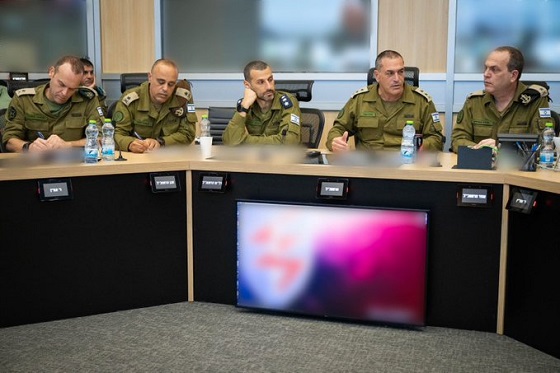
 conflict1 day ago
conflict1 day agoDespite shaky start, ceasefire shows signs of holding
-

 Business2 days ago
Business2 days agoYounger Casino Bettors Are Upping the Ante on Risky Gambling in British Columbia, Documents Show

